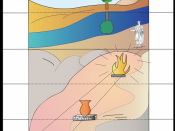"Allegory of the Cave"
In using Plato's "Allegory of the Cave," from the Republic it is hard to take in the mind of a great philosopher like Plato. It is even more difficult to try to make that mind your own if only for a short period. For that reason alone the task of fully evaluating this work is like making another effort that is in progress. His points are discussed as new and advised teaching methods of how man is related to, through, or with the world and the responsibility that enlightened individuals have to themselves and to mankind to make others aware of all that there is in this world. Through Plato's path, he makes his points clear and demands rational, balanced, and logical thoughts from his readers at all times. When you turn around, your view of the world changes. You see things you were previously not able to see, you learn things that you did not know about your environment.
(http://home.uchicago.edu/~shburch/turningpaper.html)
Plato was a student of Socrates and though the writing of "Allegory of the Cave" is all his own effort; the basis for his ideas came from none other than his own teacher, Socrates. The teacher you see is one-half of the great elements in Plato's work. Socrates is in fact a main character in the conversation of "Allegory of the Cave." Plato described symbolically the predicament in which humanity finds itself and proposes a way of deliverance and salvation. Throughout the conversation a system of ideas develop that are meant to teach the reader about themselves, their world, and how it should be viewed rather than the simple, inverted, non-involved point of view that is common to most of the every day people of this world today. The purpose of this...


